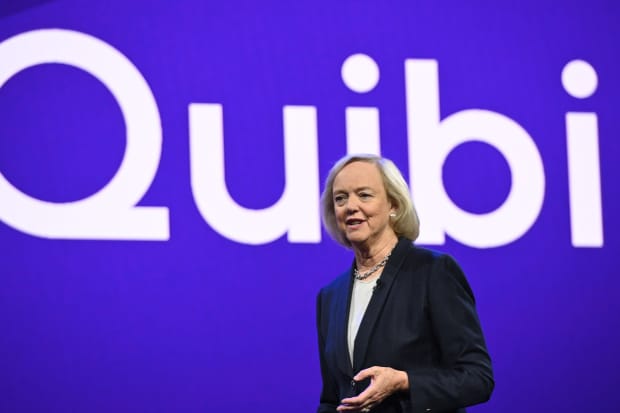This post was originally published on this site

Former eBay Inc. and Hewlett Packard Enterprise Co. CEO Meg Whitman led Quibi, which officially debuted at the 2020 Consumer Electronics Show in Las Vegas.
Getty Images
Quibi Inc. is quitting.
Late Wednesday, founder Jeffrey Katzenberg and Chief Executive Meg Whitman decided to shut down the short-form video-streaming company in an effort to return as much capital to investors as possible after discussing the company’s options with investors, the company announced.
“The world has changed dramatically since Quibi launched and our standalone business model is no longer viable,” Katzenberg said in a statement.
“While we have enough capital to continue operating for a significant period of time, we made the difficult decision to wind down the business, return cash to our shareholders, and say goodbye to our talented colleagues with grace,” Whitman said in a statement. “We continue to believe that there is an attractive market for premium, short-form content. Over the coming months we will be working hard to find buyers for these valuable assets who can leverage them to their full potential.”
Shutdown after less than a year was the most extreme option for the Los Angeles startup as it navigated lower-than-expected viewership and downloads, a patent lawsuit from interactive-video company Eko bankrolled by hedge fund Elliott Management Corp., and a pandemic that has upended its business proposition.
Employees will be laid off and Quibi will explore selling the rights to some of its content to other media and technology firms, according to the Wall Street Journal, citing people familiar with the matter.
Time appeared to be running out on Quibi. In recent weeks, the company hired a restructuring firm to evaluate its options, according to news reports in the Wall Street Journal and news site The Information. The firm recommended a shutdown, among other moves, to Quibi’s board of directors this week.
Quibi founder Katzenberg had envisioned the company as an “HBO for mobile users,” he told MarketWatch earlier this year. But the former chief executive of Walt Disney Co. DIS, +1.34% has tried to sell Quibi’s catalog of programming to Comcast Corp.’s CMCSA, +0.56% NBCUniversal and Facebook Inc. FB, +4.17%. Both declined, according to The Information.
The video-streaming platform for 5- to 10-minute clips on mobile devices bet $1.75 billion on the notion it could transform entertainment with Hollywood-quality “quick bites” content to watch “on the go” — even as much of the world was trapped at home because of COVID-19.
Before the pandemic gripped the U.S. in March, Quibi was able to attract a corral of A-list advertisers that included Walmart Inc. WMT, +0.34% and PepsiCo Inc. PEP, -0.07%. Venture capitalists and business partners lined up, pouring hundreds of millions of dollars into the startup before it launched in April. Former Hewlett Packard Enterprise Co. HPE, -0.21% and eBay Inc. EBAY, -2.54% CEO Whitman was tapped to run the show.
Big-name movie and TV talent signed up to produce films and series, including Oscar winners Steven Spielberg, Guillermo del Toro and Reese Witherspoon. Quibi was paying $100,000 a minute for feature films — a rate comparable to big productions by Netflix Inc. NFLX, -6.92%, Amazon.com Inc. AMZN, -0.99%, AT&T Inc.’s T, -0.14% HBO Max or Walt Disney Co.’s DIS, +1.34% Disney+. When it debuted in April, the service boasted 50 programs.
Read more: CES 2020: Quibi is about to see if its $1.4 billion streaming bet will pay off
But viewers proved elusive during the pandemic, prompting Quibi to increase its trial offer from two weeks to 90 days to attract more customers.

